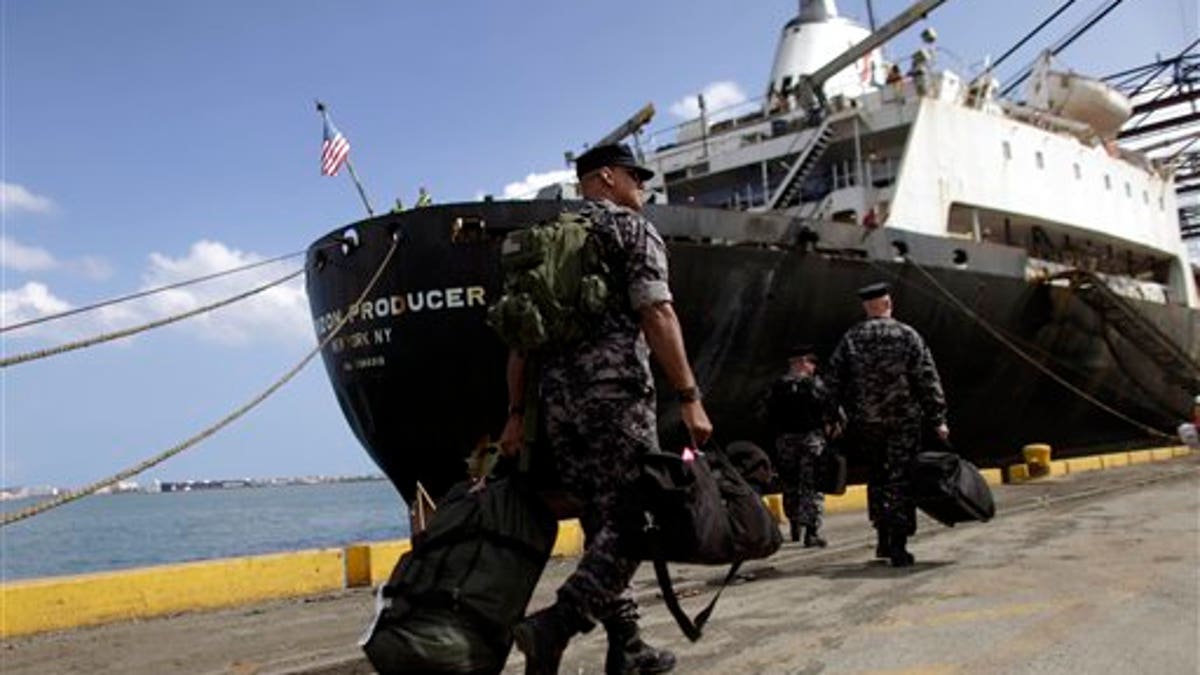
April 1, 2011: Private security officers from the International Maritime Security Network company walk to U.S. cargo vessel Horizon Producer for an anti-piracy security demonstration in Puerto Rico. (AP)
There are cameras that capture images clear enough to distinguish between a fishing vessel and a boatload of pirates 10 miles away. There are cascades of water and noxious compounds to repel invaders. And there are shields to withstand a rocket-propelled grenade.
A container ship that steamed into a Puerto Rican port Friday was old by commercial shipping standards but it had the latest in security measures, upgrades that convert it into a floating fortress designed to be impregnable to piracy.
The 720-foot Horizon Producer was temporarily outfitted as a training exercise for the crew, a demonstration for officials from Panama and Belize — both with major global shipping registries — and as an informercial for journalists. It also offers a window into the shipping industry's debate about what measures to take amid a surge in pirate attacks.
There is no longer a major pirate threat in the Caribbean. But Bill Boyce, the Horizon Producer's captain, said his crew members travel and could find themselves on a ship off East Africa, where the International Maritime Organization says more than 100 crewmen were taken hostage in January alone.
"They come on with rocket propelled grenade launchers and AK-47s and all you have is a fire hose," said Boyce, describing conditions on many commercial ships. "You're responsible for 30 people's lives ... and you don't have the tools to really help them. That's a lot of weight on a captain's shoulders."
Which is where International Maritime Security Network, LLC sees a niche. The company, based in Wellsburg, West Virginia, is starting to market its Triton Shield Anti-Piracy System, which it was testing and refining on the Horizon Producer, a 37-year-old steam-powered container ship, on its regular haul from Jacksonville, Florida, to San Juan.
The strategy starts with cameras that scan the horizon and give captains time to determine whether an approaching boat is carrying men with fishing equipment or RPG's. That may allow the ship to speed up and evade the pursuers.
If that doesn't work, the system dispatches a "wall of water," from nozzles arrayed along the length of the vessel to prevent pirates from boarding with grappling hooks. A separate system sprays a noxious compound that makes people retch, vomit and pass out.
CEO Timothy Nease, who says he doesn't know what's in the compound but insists it's biodegradable. He says no one can withstand either the compound or the water system, spraying at 150 gallons per minute, especially when a ship is running full speed and throwing up a wake.
"The water alone is a big deterrent," Nease said. "That thing grounds you; it's like being waterboarded almost."
If the pirates do manage to get on board, they encounter armed guards, equipped with bullet-resistant body shields and M-4 carbines and perhaps a .50 caliber rifle.
"That M-50 up there will blow a pirate boat completely out of the water," Nease said. "They get one warning shot. If they were to penetrate this ... then we would use deadly force. But we would never use serious deadly force unless we were in fear of serious bodily injury or death."
And if all that fails, IMSN trains crews how to hunker down in an on-board safe room, known as a citadel, and what do if taken hostage.
The cost varies depending on the size of the vessel and how much of the system a shipping company wants to buy, but it will generally range from $12,000 to nearly $100,000 for just the equipment and installation, Nease said.
There are a growing number of companies in the business because of the rash of hijackings, particularly off lawless Somalia, in recent years, said Jeffrey Kline, a retired Navy captain and expert on piracy at the Naval Postgraduate School in Monterey, California.
In the past, many captains used makeshift security such as fire hoses to spray water over the stern or concertina wire along sides of the vessel. The use of armed security teams is a major debate in the industry, Kline said by telephone. Some shipping companies are reluctant to use them because guns could increase liability from accidents and escalate the violence with pirates. They are also banned on commercial vessels in some international ports.
Still, the firing of warning shots at pirates seems to be having the most success protecting ships. "Two things that deter them are speed and live fire," he said.







































